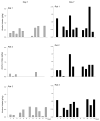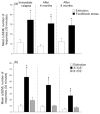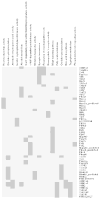Genetically selected Marchigian Sardinian alcohol-preferring (msP) rats: an animal model to study the neurobiology of alcoholism
- PMID: 16961763
- PMCID: PMC3035824
- DOI: 10.1111/j.1369-1600.2006.00032.x
Genetically selected Marchigian Sardinian alcohol-preferring (msP) rats: an animal model to study the neurobiology of alcoholism
Abstract
The present article provides an up-to-date review summarizing almost 18 years of research in genetically selected Marchigian Sardinian alcohol-preferring (msP) rats. The results of this work demonstrate that msP rats have natural preference for ethanol characterized by a spontaneous binge-type of drinking that leads to pharmacologically significant blood ethanol levels. This rat line is highly vulnerable to relapse and presentation of stimuli predictive of alcohol availability or foot-shock stress can reinstate extinguished drug-seeking up to 8 months from the last alcohol experience. The msP rat is highly sensitive to stress, shows an anxious phenotype and has depressive-like symptoms that recover following ethanol drinking. Interestingly, these animals have an up-regulated corticotrophin releasing factor (CRF) receptor 1 system. Clinical studies have shown that alcoholic patients often drink ethanol in the attempt to self-medicate from negative affective states and to search for anxiety relief. We propose that msP rats represent an animal model that largely mimics the human alcoholic population that due to poor ability to engage in stress-coping strategies drink ethanol as a tension relief strategy and for self-medication purposes.
Figures





Similar articles
-
Genetically selected alcohol-preferring msP rats to study alcohol use disorder: Anything lost in translation?Neuropharmacology. 2021 Mar 15;186:108446. doi: 10.1016/j.neuropharm.2020.108446. Epub 2021 Jan 18. Neuropharmacology. 2021. PMID: 33476639 Free PMC article. Review.
-
Glutamatergic transmission in the central nucleus of the amygdala is selectively altered in Marchigian Sardinian alcohol-preferring rats: Alcohol and CRF effects.Neuropharmacology. 2016 Mar;102:21-31. doi: 10.1016/j.neuropharm.2015.10.027. Epub 2015 Oct 28. Neuropharmacology. 2016. PMID: 26519902 Free PMC article.
-
Dysregulation of Nociceptin/Orphanin FQ and Dynorphin Systems in the Extended Amygdala of Alcohol Preferring Marchigian Sardinian (msP) Rats.Int J Mol Sci. 2021 Feb 28;22(5):2448. doi: 10.3390/ijms22052448. Int J Mol Sci. 2021. PMID: 33671048 Free PMC article.
-
Enhanced GABAergic transmission in the central nucleus of the amygdala of genetically selected Marchigian Sardinian rats: alcohol and CRF effects.Neuropharmacology. 2013 Apr;67:337-48. doi: 10.1016/j.neuropharm.2012.11.026. Epub 2012 Dec 4. Neuropharmacology. 2013. PMID: 23220399 Free PMC article.
-
Phenotypic characterization of genetically selected Sardinian alcohol-preferring (sP) and -non-preferring (sNP) rats.Addict Biol. 2006 Sep;11(3-4):324-38. doi: 10.1111/j.1369-1600.2006.00031.x. Addict Biol. 2006. PMID: 16961762 Review.
Cited by
-
Stress history increases alcohol intake in relapse: relation to phosphodiesterase 10A.Addict Biol. 2012 Sep;17(5):920-33. doi: 10.1111/j.1369-1600.2012.00460.x. Epub 2012 Jun 28. Addict Biol. 2012. PMID: 22741603 Free PMC article.
-
Modeling relapse in animals.Curr Top Behav Neurosci. 2013;13:403-32. doi: 10.1007/7854_2012_202. Curr Top Behav Neurosci. 2013. PMID: 22389178 Free PMC article. Review.
-
Shaping vulnerability to addiction - the contribution of behavior, neural circuits and molecular mechanisms.Neurosci Biobehav Rev. 2018 Feb;85:117-125. doi: 10.1016/j.neubiorev.2017.05.019. Epub 2017 May 29. Neurosci Biobehav Rev. 2018. PMID: 28571877 Free PMC article. Review.
-
Tacr1 gene variation and neurokinin 1 receptor expression is associated with antagonist efficacy in genetically selected alcohol-preferring rats.Biol Psychiatry. 2013 Apr 15;73(8):774-81. doi: 10.1016/j.biopsych.2012.12.027. Epub 2013 Feb 16. Biol Psychiatry. 2013. PMID: 23419547 Free PMC article.
-
Human and laboratory rodent low response to alcohol: is better consilience possible?Addict Biol. 2010 Apr;15(2):125-44. doi: 10.1111/j.1369-1600.2009.00191.x. Addict Biol. 2010. PMID: 20148776 Free PMC article. Review.
References
-
- Addolorato G, Leggio L, Abenavoli L, DeLorenzi G, Parente A, Caputo F, Janiri L, Capristo E, Rapaccini GL, Gasbarrini G. Suppression of alcohol delirium tremens by baclofen administration: a case report. Clin Neuropharmacol. 2003;26:258–262. - PubMed
-
- Arlinde C, Sommer W, Bjork K, Reimers M, Hyytia P, Kiianmaa K, Heilig M. A cluster of differentially expressed signal transduction genes identified by microarray analysis in a rat genetic model of alcoholism. Pharmacogenomics J. 2004;4:208–218. - PubMed
-
- Boening JA, Lesch OM, Spanagel R, Wolffgramm J, Narita M, Sinclair D, Mason BJ, Wiesbeck GA. Pharmacological relapse prevention in alcohol dependence: from animal models to clinical trials. Alcohol Clin Exp Res. 2001;2(5 Suppl ISBRA):127S–131S. - PubMed
-
- Boothby LA, Doering PL. Acamprosate for the treatment of alcohol dependence. Clin Ther. 2005;27:695–714. - PubMed
-
- Chen YC, Lu RB, Peng GS, Wang MF, Wang HK, Ko HC, Chang YC, Lu JJ, Li TK, Yin SJ. Alcohol metabolism and cardiovascular response in an alcoholic patient homozygous for the ALDH2*2 variant gene allele. Alcohol Clin Exp Res. 1999;23:1853–1860. - PubMed
Publication types
MeSH terms
Substances
Grants and funding
LinkOut - more resources
Full Text Sources
Other Literature Sources
Medical
Research Materials

